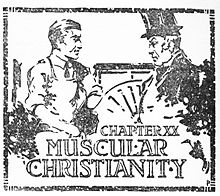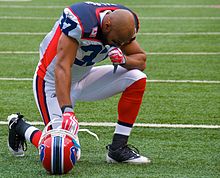- Muscular Christianity
-
 Illustration by F. R. Gruger for the novel Hepsey Burke, by F. N. Westcott, 1915. The Episcopal rector Donald Maxwell (left) gets little pay because of interference from Sylvester Bascom (right), so Maxwell shovels stone to support himself and his wife. Here he confronts Bascom, who accuses him of having no pride.
Illustration by F. R. Gruger for the novel Hepsey Burke, by F. N. Westcott, 1915. The Episcopal rector Donald Maxwell (left) gets little pay because of interference from Sylvester Bascom (right), so Maxwell shovels stone to support himself and his wife. Here he confronts Bascom, who accuses him of having no pride.
Muscular Christianity is a term for a movement originating during the Victorian era which stressed the need for energetic Christian activism in combination with an ideal of vigorous masculinity. It was most associated with the English writers Charles Kingsley and Thomas Hughes, and in Canada with Ralph Connor, though the name was bestowed by others.
Kingsley and Hughes promoted physical strength and health (at least for men) as well as an active pursuit of Christian ideals in personal life and politics.
Muscular Christianity has continued itself through organisations that combine physical and Christian spiritual development.[1] It is influential within both Catholicism and Protestantism.[2][3]
Contents
Origins
Muscular Christianity can be traced back to Paul the Apostle, who used athletic metaphors to describe the challenges of a Christian life.[4] However, the explicit advocacy of sport and exercise in Christianity did not appear until 1762, when Rousseau's Emile described physical education as important for the formation of moral character.[5]
The term "Muscular Christianity" became well known in a review by the clergyman T. C. Sandars of Kingsley's novel Two Years Ago in the February 21, 1857 issue of the Saturday Review.[4][6] (The term had appeared slightly earlier.)[7] Kingsley wrote a reply to this review in which he called the term "painful, if not offensive",[8] but he later used it favourably on occasion.[9] Hughes used it in Tom Brown at Oxford; saying that it was "a good thing to have strong and well-exercised bodies," he specified, "The least of the muscular Christians has hold of the old chivalrous and Christian belief, that a man's body is given him to be trained and brought into subjection, and then used for the protection of the weak, the advancement of all righteous causes, and the subduing of the earth which God has given to the children of men."[10]
In addition to the beliefs stated above, muscular Christianity preached the spiritual value of sports, especially team sports. As Kingsley said, "games conduce, not merely to physical, but to moral health".[11]
Influence
By 1901, muscular Christianity was influential enough in England that one author could praise "the Englishman going through the world with rifle in one hand and Bible in the other" and add, "If asked what our muscular Christianity has done, we point to the British Empire."[12]
 The American football player George Wilson prays before a game. Wilson "says he always carries his Christian faith with him"[13] and has received awards for service to the community.[14]
The American football player George Wilson prays before a game. Wilson "says he always carries his Christian faith with him"[13] and has received awards for service to the community.[14]
Muscular Christianity spread to other countries in the 19th century. In the United States it appeared first in private schools and then in the YMCA and in the preaching of evangelists such as Dwight L. Moody.[15] (The addition of athletics to the YMCA led to, among other things, the invention of basketball and volleyball.) Parodied by Sinclair Lewis in Elmer Gantry (though he had praised the Oberlin College YMCA for its "positive earnest muscular Christianity") and out of step with theologians such as Reinhold Niebuhr, its influence declined in American mainline Protestantism. Nonetheless it was felt in such evangelical organizations as the Fellowship of Christian Athletes, Athletes in Action, and the Promise Keepers.[16]
See also
- New Testament athletic metaphors
- Pauline Christianity
- Sports ministry
References
- ^ David Yamane, Keith A. Roberts (2012). Religion in Sociological Perspective. Pine Forge Press. http://books.google.com/books?id=O6j6joobFCIC&pg=PA365&dq=Muscular+Christianity+Athletes+in+Action#v=onepage&q=Muscular%20Christianity%20Athletes%20in%20Action&f=false. Retrieved 1 August 2011. "Muscular Christianity's main focus was to address the concerns of boys directly, not abstractly, so that they could apply religion to their lives. The idea did not catch on quickly in the United States, but over time it has become one of the most notable tools employed in Evangelical Protestant outreach ministries."
- ^ Alister E. McGrath (2008). Christianity's Dangerous Idea. HarperOne. http://books.google.com/books?id=KQzhEclsl94C&pg=PT380&dq=Muscular+Christianity+Athletes+in+Action#v=onepage&q=Muscular%20Christianity%20Athletes%20in%20Action&f=false. Retrieved 1 August 2011. "Nor is sport a purely Protestant concern: Catholicism can equally well be said to promote muscular Christianity, at least to some extent, through the athletic programs of such leading schools as the University of Notre Dame in Indiana."
- ^ Michael S. Kimmel; Amy Aronson (2004). Men and Masculinities: a Social, Cultural, and Historical Encyclopædia, Volume 1. ABC-CLIO. http://books.google.com/books?id=jWj5OBvTh1IC&pg=PA558&dq=muscular+christianity+protestantism+catholicism#v=onepage&q&f=false. Retrieved 1 August 2011. "As neo-orthodoxy arose in the mainline Protestant churches, Muscular Christianity declined there. It did not, however, disappear from American landscape, because it found some new sponsors. In the early 2000s these include the Catholic Church and various rightward-leaning Protestant groups. The Catholic Church promotes Muscular Christianity in the athletic programs of schools such as Notre Dame, as do evangelical Protestant groups such as Promise Keepers, Athletes in Action, and the Fellowship of Christian Athletes."
- ^ a b Watson, Nick J. Muscular Christianity in the modern age. Sport and spirituality (2007), pages 81–82.
- Athletic metaphors attributed to Paul:
- ^ Watson, Nick J.; Stuart Weir and Stephen Friend (2005). "The Development of Muscular Christianity in Victorian Britain and Beyond". Journal of Religion & Society 7: paragraph 7. http://moses.creighton.edu/JRS/2005/2005-2.html.
- ^ Ladd, Tony; James A. Mathisen (1999). Muscular Christianity: Evangelical Protestants and the Development of American Sport. Grand Rapids, Mich.: BridgePoint Books. pp. 13–14. ISBN 0-8010-5847-3.
- ^ Anonymous (December, 1852). "Pastoral Theology: Power in the Pulpit". The Eclectic Review IV: 766. http://books.google.com/books?id=DXg3AAAAYAAJ&pg=PA766. Retrieved 2011-04-19. The article is a review of a book of lectures by the theologian Alexandre Vinet.
- ^ Watson, Weir, and Friend, paragraph 6.
- ^ Kingsley, Charles (1889). Letters and Memoirs of His Life, vol. II. Scribner's. p. 54. Quoted by Rosen, David (1994). "The volcano and the cathedral: muscular Christianity and the origins of primal manliness". In Donald E. Hall (ed.). Muscular Christianity: Embodying the Victorian Age. Cambridge University Press. p. 17. ISBN 0-521-45318-6.
- ^ Chapter 11, quoted by Ladd and Mathisen.
- ^ Kingsley, Charles (1879). "Nausicaa in London: or, The Lower Education of Women". Health and Education (1887 ed.). Macmillan and Co. p. 86. http://books.google.com/books?id=K0QEAAAAYAAJ&pg=PA86. Retrieved 2011-06-13. Quoted by Ladd and Mathisen).
- ^ Cotton Minchin, J. G. (1901). Our Public Schools: Their Influence on English History; Charter House, Eton, Harrow, Merchant Taylors', Rugby, St. Paul's Westminster, Winchester. Swan Sonnenschein & Co. p. 113. http://books.google.com/?id=b-1JAAAAIAAJ&pg=PA113&dq=%22muscular+Christianity%22. Retrieved 2009-11-09.
- ^ McNeil, Harold (2010-11-20). "The faith behind football: Bills players talk to city's youth about God's role in their success". The Buffalo News. http://www.buffalonews.com/city/article259422.ece. Retrieved 2011-03-27.
- ^ Major, Andy (2010-01-05). George Wilson wins Walter Payton Man of the Year. The Official Website of the Buffalo Bills. http://www.buffalobills.com/news/article-1/George-Wilson-wins-Walter-Payton-Man-of-the-Year/14e16884-7136-4771-a71c-3399d171265b. Retrieved 2011-03-27.
- ^ Heather, Hendershot (2004). Shaking the World for Jesus: Media and Conservative Evangelical Culture. University of Chicago Press. p. 226. ISBN 0-226-32679-9.
- ^ Putney, Clifford (2001). Muscular Christianity: Manhood and Sports in Protestant America, 1880–1920. Harvard University Press. pp. 205–206. ISBN 0674011252. http://books.google.com/books?id=tkgpnpfWm2gC&q=gideons.
External links
- The Manly Christ: a New View". Robert Warren Conant]]. 1904.
- The Masculine Power of Christ; or, Christ Measured as a Man. Jason Noble Pierce. 1912.
Categories:- Christian movements
- 19th-century Christianity
- Promise Keepers
- Pauline Christianity
Wikimedia Foundation. 2010.
